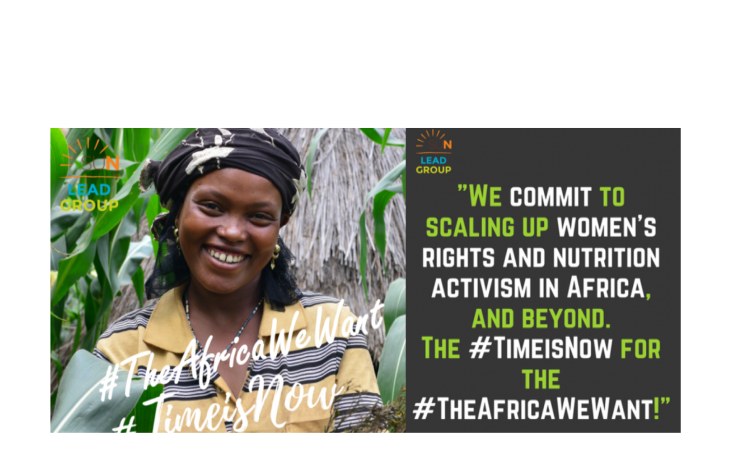Op-ed by Martin Chungong, Secretary-General of IPU, Dr Ibrahim Mayaki, CEO of NEPAD Agency and Nahas Angula, former Prime Minister of Namibia and Convener of the Namibia Alliance for Improved Nutrition (NAFIN)
Johannesburg, 08 March 2018 - On the occasion of International Women’s Day, three African leaders and activists, Martin Chungong, Cameroonian Secretary General of the Inter-Parliamentary Union, Dr Ibrahim Mayaki, former Prime Minister of Niger and CEO of NEPAD Agency, and Nahas Angula, former Prime Minister of Namibia and Convener of the Namibia Alliance for Improved Nutrition (NAFIN), come together to celebrate rural and urban crusaders who have transformed women’s lives and call for more activists to speak up for gender equality to fight malnutrition across Africa.
Today, as we mark International Women’s Day, we celebrate not only all women, but especially the activists – rural and urban, men and women – who are transforming women’s lives. Right now, women and men across Africa are part of a movement sweeping across the world for women’s rights, equality and justice.
You do not have to look far to see – or hear – women on the continent slowly breaking the silence, joining the #MeToo campaign on social media, raising their voices in unison alongside many men and against the status quo, organising for better representation in decision-making and demanding land rights and equal pay for work of equal value.
However, with the increase in hunger and food insecurity seen last year across parts of sub-Saharan Africa – for the first time in decades – there are few rights as important to our future survival as the right to adequate food and good nutrition. This will not happen unless each woman and man, girl and boy is equally valued and has the same access to food. This means that, when we move from thinking to acting on nutrition and food security, we must also think and act on gender equality and women’s empowerment.
Throughout history, activism in Africa has yielded enormous results. Many women have fought for justice for women before us. Today this is not only a moral duty, it is the smart thing to do. Recently, countries such as Senegal and Tunisia have made strides in ensuring equal rights for both women and men. Rwanda has secured the highest percentage of women in parliament in the world, whilst women in Liberia and South Sudan have been at the forefront of peace and reconciliation efforts. In the words of Nelson Mandela – our ‘own’ Madiba – whose 100th birthday we will celebrate later this year, "freedom cannot be achieved unless women have been emancipated from all forms of oppression". Sadly, no country has achieved this freedom yet.
Where there is food insecurity, rural women and girls are disproportionally affected and more likely to experience the multiple burdens of malnutrition. They are often tasked with making sure every family and community member reaps the benefits of the best possible food and nutrients available and are involved at each stage of the food value chain – from farm to fork.
Although there are no large differences in the number of malnourished girls versus boys under five years old, the difference in power between males and females really becomes visible as girls reach adolescence. Malnourished mothers, especially those who have not attended secondary school, are more likely to give birth to malnourished girls and boys, perpetuating a vicious intergenerational cycle – with devastating effects for the brain power of the continent.
It is widely accepted that good nutrition is a maker and marker of sustainable development. What we now know is that gender equality is a maker and marker of good nutrition. With this knowledge, the main message we have for policy-makers, leaders and activists all over Africa is to scale up investments in women for better nutrition and food security everywhere. Yet, without empowering lawmakers to unblock resources from national budgets and putting in place the necessary means and policies in support of women and girls, no initiative will succeed.
Yesterday, we gathered together to address a high-level event of the Pan-African Parliament (PAP) Alliance for Food Security and Nutrition in Johannesburg. This Alliance has been tasked with ensuring that food security and nutrition remain at the highest level of both political and legislative agendas. We brought together a regional platform for African Members of Parliament to make sure that women’s and girls’ rights, needs and agency are at the front and centre of all actions.
The 2030 Agenda for Sustainable Development promises to leave no one behind. Recently, the publication Nature estimated that no single African country is set to end childhood malnutrition by 2030, due to large disparities within countries themselves. This is in spite of the fact that most African countries, especially much of sub-Saharan Africa and eastern and southern regions, have shown improvements.
As members of the Lead Group of the Scaling Up Nutrition (SUN) Movement – a voluntary push for better nutrition which today counts 60 countries, many of whom are African – we know that successful nutrition approaches are those that have sought to address and eliminate gender inequalities. Much of the reduction in hunger worldwide between 1970 and 1995 is a result of improvements in women’s status and access to decision-making, including in parliaments. We know that if we give a girl access to secondary schooling, more than 25 per cent fewer girls and boys will be stunted, and will be able to develop normally. The evidence is clear. Now is the time to act.
International Women’s Day is not just a celebration but a reminder to us to remain activists in our own right, not only as heads of agencies which promote equality, but also as individuals. Together, let us empower women in all settings, rural and urban, and make improved nutrition a reality.
We commit to scaling up women’s rights and nutrition activism in Africa, and beyond. And hope you will do the same. The #TimeisNow for the #TheAfricaWeWant.


